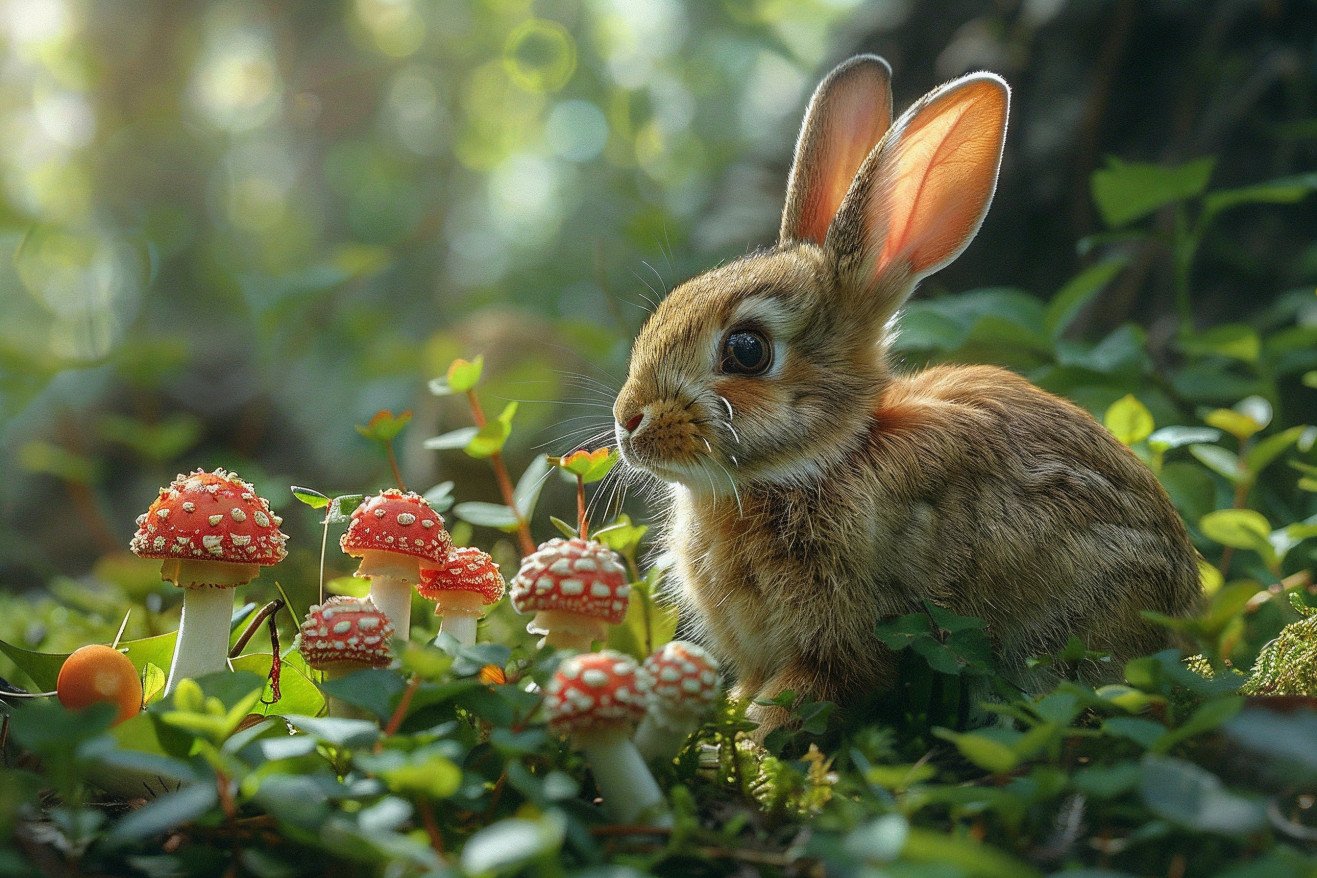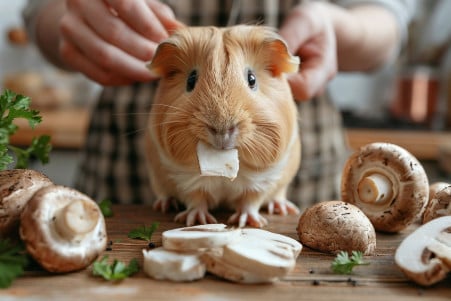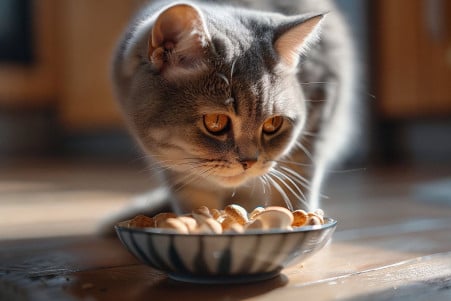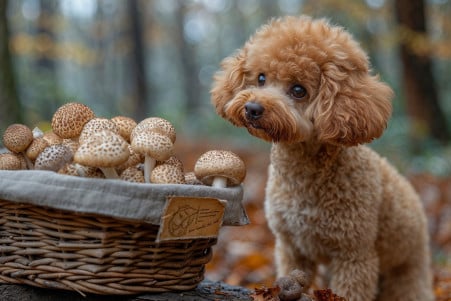Can Rabbits Have Mushrooms? A Look at Safe Options
5 April 2024 • Updated 4 April 2024

Thinking about introducing mushrooms into your rabbit's diet? Here's what you need to know about the types of mushrooms that are safe for your furry, veggie-loving friend. There are a few types of mushrooms that rabbits can eat in small amounts. This includes white or cremini mushrooms. However, it's best to avoid wild mushrooms because many are poisonous and can cause your rabbit to become very sick. If you are going to feed your rabbit store-bought mushrooms, make sure to only give them a small amount as part of a well-balanced diet.
Mushrooms aren't a necessary part of a rabbit's diet, but they can be a good source of extra nutrients and a little variety for rabbits who are willing to try new foods. To help you decide if mushrooms are right for your rabbit, we've looked at the latest studies from animal nutritionists, veterinarians, and rabbit owners to find out more about the benefits, risks, and how much you should feed your rabbit. Armed with this information, you can decide if the occasional mushroom can be a healthy addition to your rabbit's diet.
Can rabbits eat mushrooms?
Rabbit Mushroom Poisoning Symptoms
Mushroom poisoning in rabbits can cause a variety of symptoms, including gastrointestinal and neurological problems, as well as liver and kidney failure. According to the Merck Veterinary Manual, the time it takes for symptoms to appear after ingestion is an important factor in determining the prognosis of mushroom poisoning in rabbits - the shorter the time, the less severe the toxicity.
Common symptoms of mushroom poisoning include vomiting, diarrhea, and abdominal pain, which can occur shortly after ingesting certain types of mushrooms. In addition, the Oxbow Animal Health notes that mycotoxins in mushrooms can cause gastrointestinal upset in rabbits. Neurological symptoms, such as restlessness, disorientation, tremors, seizures, and respiratory distress can also occur, depending on the specific mycotoxins that the rabbit is exposed to.
In the most serious cases, liver and kidney failure can happen, and if not treated quickly, this can lead to organ failure. It's important to watch your rabbit for any symptoms after you suspect they have eaten a mushroom. If you see any changes in behavior or health, it's important to get them to the vet right away, as the effects of mushroom poisoning can be fatal. If you can, bring information about the time of exposure and any samples of the mushrooms that you think your rabbit may have eaten to the vet, as this can help them diagnose the poisoning and determine the best course of treatment.
Bunny-Proofing Your Home and Environment
Protecting your rabbit from the dangers of toxic mushrooms means bunny-proofing both your home and outdoor environment. According to the Best Friends Animal Society, it's important to think like a rabbit and look for any potential access points to toxic mushrooms in your environment.
First, look around your indoor spaces for houseplants that are toxic to rabbits. Many common houseplants, including amaryllis, daffodil, and philodendron, can be dangerous to rabbits. The Animal Humane Society also suggests making sure that your rabbit can't get to insecticides or other toxic household items. In addition, make sure to check for and protect any exposed electrical cords or wires that rabbits might chew on.
When it comes to outdoor access, the Bunny Lady recommends creating a safe, enclosed area that's free of mushrooms. In addition, make sure that your rabbit can't access any areas that have been treated with pesticides or fertilizers or where wild animals have left droppings. It's also important to supervise your rabbit at all times, as the House Rabbit Resource Network explains that even a few seconds alone can be long enough for a predator to attack.
It's important to keep up with your bunny-proofing efforts over time. Regularly check your home and outdoor spaces and make any necessary changes to ensure that your rabbit is protected from the dangers of toxic mushrooms. With these steps, you can make sure that your rabbit has a safe, mushroom-free environment.
Healthy Alternatives: Safe Foods for Rabbits
Rabbits need a diet that is full of a variety of nutrients to stay healthy. Best Friends Animal Society explains that 80-90% of a rabbit's diet should be hay. Good types of hay include timothy, orchard grass, brome, and oat hay. Alfalfa hay is not recommended for adult rabbits.
Rabbit.org explains that fresh vegetables should make up about 10% of an adult rabbit's diet. Leafy greens like arugula, kale, and spinach are good options, as are non-leafy vegetables like bell peppers, carrots, and broccoli. Fruits like berries and melon can be given as a treat, but they should be limited to less than 5% of the rabbit's diet.
It's important to introduce new foods to rabbits slowly and to watch for any signs of an allergic reaction, according to Chewy. By offering a variety of safe, healthy foods, you can make sure that your rabbit's diet is well-rounded and interesting.
Enrichment and Chew Toys for Rabbits
Because rabbits are natural chewers, it's important to make sure they have access to safe materials that they can chew on. According to Oxbow Animal Health, grass hay is the best chew toy for rabbits because it helps keep their teeth from overgrowing and provides important mental enrichment.
In addition to hay, Oxbow suggests that untreated wood, dried apple sticks, cardboard, and bamboo toys are all safe materials that rabbits can chew on. These materials will allow rabbits to satisfy their natural chewing instincts without the dangers that come with other materials. Woven willow or vine toys can also be a source of enrichment and exercise, according to Oxbow.
It's also important to make sure that rabbits have a constant supply of fresh, clean hay to meet their chewing and dietary needs, according to Best Friends Animal Society. By making sure that rabbits have a variety of safe materials to chew on, you can help them satisfy their natural instincts and keep them from seeking out and eating potentially toxic materials like mushrooms.
Wrapping Up: Evaluating Mushrooms for Rabbit Consumption
Mushrooms, whether wild or store-bought, should never be fed to rabbits due to the presence of toxic compounds. Consuming mushrooms can lead to severe symptoms in rabbits, including gastrointestinal distress, neurological issues, and potentially life-threatening organ damage. Prompt veterinary care is crucial if mushroom ingestion is suspected, as treating mushroom poisoning is extremely difficult.
To keep rabbits safe, it's important to thoroughly inspect indoor and outdoor environments for potential mushroom hazards, securing areas where wild mushrooms may grow and using barriers to limit access. Providing a balanced diet focused on hay, fresh vegetables, and occasional fruits can ensure rabbits receive the nutrition they need without the risk of mushroom toxicity. By prioritizing safety and following these guidelines, rabbit owners can help protect the health and well-being of their beloved pets.


